英语语言学实用教程 unit 1 key
语言学教程第1单元

ran away with the gun.
Language is hierarchical. Stratification is the physical manifestation of the infinite use of finite means
3. Creativity ( 创 造 性 ) : language is resourceful because of its duality and its recursiveness Words can be used in new ways to mean new things. Language has its potential to create endless sentences. e.g. He bought a book which was written by a teacher who taught in a school which was known for its graduates who…
朱永生, “论语言符号的任意性与象似性”, 《外语教学与研究》2002年第1期
Design features of language
2. Duality ( 二 重 性 ) : the property of having two levels of structures, units of the primary level are composed of elements of the secondary level and each of the two levels has its own principles of organization The mad man
陈新仁《英语语言学实用教程》(考研真题精选选择题)【圣才出品】
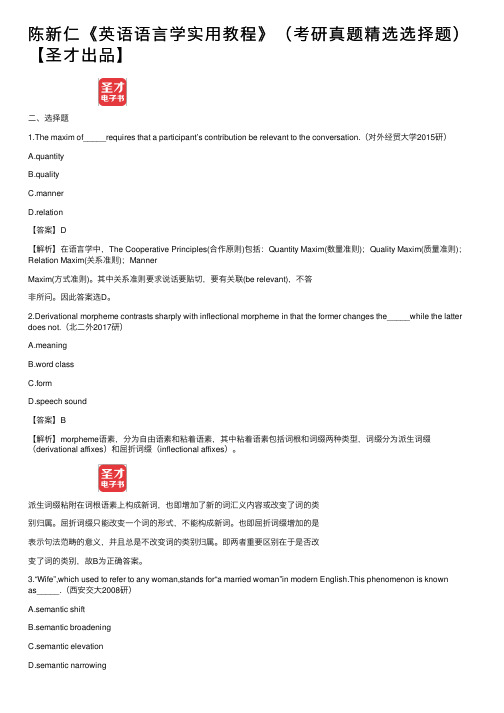
陈新仁《英语语⾔学实⽤教程》(考研真题精选选择题)【圣才出品】⼆、选择题1.The maxim of_____requires that a participant’s contribution be relevant to the conversation.(对外经贸⼤学2015研)A.quantityB.qualityC.mannerD.relation【答案】D【解析】在语⾔学中,The Cooperative Principles(合作原则)包括:Quantity Maxim(数量准则);Quality Maxim(质量准则);Relation Maxim(关系准则);MannerMaxim(⽅式准则)。
其中关系准则要求说话要贴切,要有关联(be relevant),不答⾮所问。
因此答案选D。
2.Derivational morpheme contrasts sharply with inflectional morpheme in that the former changes the_____while the latter does not.(北⼆外2017研)A.meaningB.word classC.formD.speech sound【答案】B【解析】morpheme语素,分为⾃由语素和粘着语素,其中粘着语素包括词根和词缀两种类型,词缀分为派⽣词缀(derivational affixes)和屈折词缀(inflectional affixes)。
派⽣词缀粘附在词根语素上构成新词,也即增加了新的词汇义内容或改变了词的类别归属。
屈折词缀只能改变⼀个词的形式,不能构成新词。
也即屈折词缀增加的是表⽰句法范畴的意义,并且总是不改变词的类别归属。
即两者重要区别在于是否改变了词的类别,故B为正确答案。
3.“Wife”,which used to refer to any woman,stands for“a married woman”in modern English.This phenomenon is knownas_____.(西安交⼤2008研)A.semantic shiftB.semantic broadeningC.semantic elevationD.semantic narrowing【答案】D【解析】词义缩⼩是指原来的词义缩⼩或被限制到某个明确的意义上。
《英语语言学实用教程》
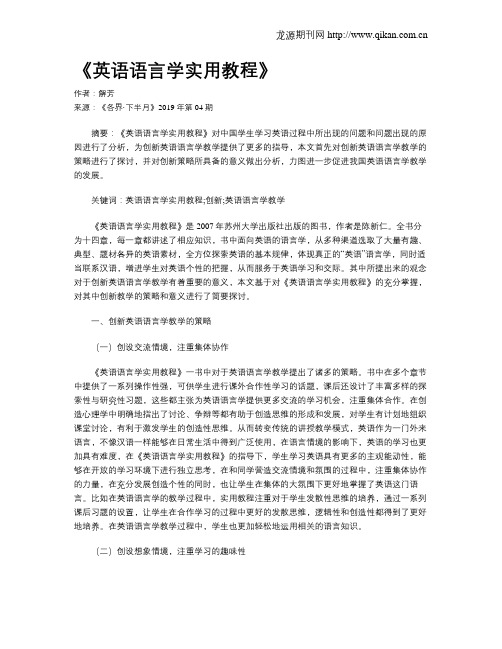
《英语语言学实用教程》作者:解芳来源:《各界·下半月》2019年第04期摘要:《英语语言学实用教程》对中国学生学习英语过程中所出现的问题和问题出现的原因进行了分析,为创新英语语言学教学提供了更多的指导,本文首先对创新英语语言学教学的策略进行了探讨,并对创新策略所具备的意义做出分析,力图进一步促进我国英语语言学教学的发展。
关键词:英语语言学实用教程;创新;英语语言学教学《英语语言学实用教程》是2007年苏州大学出版社出版的图书,作者是陈新仁。
全书分为十四章,每一章都讲述了相应知识,书中面向英语的语言学,从多种渠道选取了大量有趣、典型、题材各异的英语素材,全方位探索英语的基本规律,体现真正的“英语”语言学,同时适当联系汉语,增进学生对英语个性的把握,从而服务于英语学习和交际。
其中所提出来的观念对于创新英语语言学教学有着重要的意义,本文基于对《英语语言学实用教程》的充分掌握,对其中创新教学的策略和意义进行了简要探讨。
一、创新英语语言学教学的策略(一)创设交流情境,注重集体协作《英语语言学实用教程》一书中对于英语语言学教学提出了诸多的策略。
书中在多个章节中提供了一系列操作性强,可供学生进行课外合作性学习的话题,课后还设计了丰富多样的探索性与研究性习题,这些都主张为英语语言学提供更多交流的学习机会,注重集体合作。
在创造心理学中明确地指出了讨论、争辩等都有助于创造思维的形成和发展,对学生有计划地组织课堂讨论,有利于激发学生的创造性思维。
从而转变传统的讲授教学模式,英语作为一门外来语言,不像汉语一样能够在日常生活中得到广泛使用,在语言情境的影响下,英语的学习也更加具有难度,在《英语语言学实用教程》的指导下,学生学习英语具有更多的主观能动性,能够在开放的学习环境下进行独立思考,在和同学营造交流情境和氛围的过程中,注重集体协作的力量,在充分发展创造个性的同时,也让学生在集体的大氛围下更好地掌握了英语这门语言。
语言学Chapter1(key)
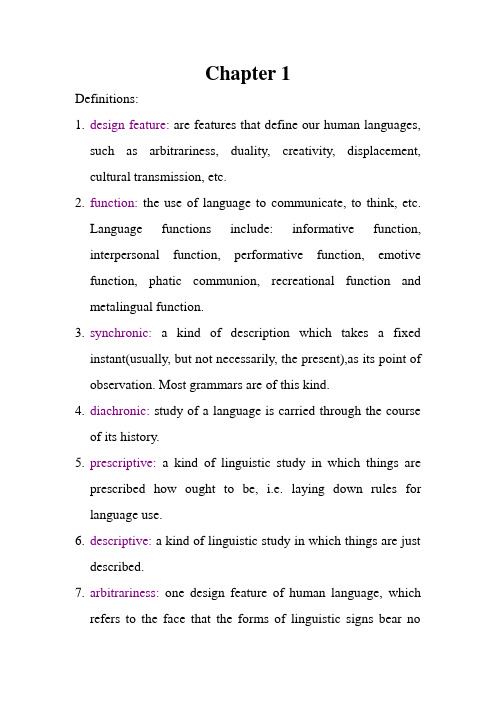
Chapter 1Definitions:1.design feature: are features that define our human languages,such as arbitrariness, duality, creativity, displacement, cultural transmission, etc.2.function:the use of language to communicate, to think, etc.Language functions include: informative function, interpersonal function, performative function, emotive function, phatic communion, recreational function and metalingual function.3.synchronic: a kind of description which takes a fixedinstant(usually, but not necessarily, the present),as its point of observation. Most grammars are of this kind.4.diachronic: study of a language is carried through the courseof its history.5.prescriptive:a kind of linguistic study in which things areprescribed how ought to be, i.e. laying down rules for language use.6.descriptive: a kind of linguistic study in which things are justdescribed.7.arbitrariness: one design feature of human language, whichrefers to the face that the forms of linguistic signs bear nonatural relationship to their meaning.8.duality: one design feature of human language, which refersto the property of having two levels of are composed of elements of the secondary level and each of the two levels has its own principles of organization.9.displacement:one design feature of human language, whichmeans human language enable their users to symbolize objects, events and concepts which are not present c in time and space at the moment of communication.10.p hatic communion: one function of human language, whichrefers to the social interaction of language.11.m etalanguage:certain kinds of linguistic signs or terms forthe analysis and description of particular studies.12.m acrolinguistics: he interacting study between language andlanguage-related disciplines such as psychology, sociology, ethnograph, science of law and artificial intelligence etc.Branches of macrolinguistics include psycholinguistics, sociolinguistics, anthropological linguistics, etc.13.c ompetence: language user’s underlying knowledge aboutthe system of rules.14.p erformance: the actual use of language in concrete situation.15.l angue: the linguistic competence of the speaker.16.p arole:the actual phenomena or data oflinguistics(utterances).Q4:Not really. Onomatopoeia is at most suggestive of the natural sounds they try to capture. They are arbitrary as signifiers.Q9:Yes. All human languages are complicated systems of communication. This is decided by their shared design features. Q11:If someone is sneezing violently, maybe your parents and grandparents may say: “Are you ok?”, “D o you need to see a doctor?”, “Do you need some water?”, “Do you need a handkerchief?”, “Do you have a cold?” or something like these to show their concerns.Q18:Ethnic background, socioeconomic status, region of the country, physical state changes within the indicidual, such as intoxication, fatigue, distraction, illness.。
语言学教程Chapter_ 1

How to study
1. Preview and review 2. Discuss with your classmates & ask
3. Could the sentence— “As the night fell, the wind rose” be expressed as “As the wind rose, the night fell”? If not, why? Does this indicate a degree of non-arbitrariness about word order?
2. Language is arbitrary
The relation between expression and content is not natural but conventional. And this conventional relation varies from language to language.
e.g. In the 8-figure dance that a bee uses to indicate the honey source, there are fixed patterns (the direction of the bee’s head and the way that it dances indicate the quantity and distance of the honey source)
book?
英语语言学-语言学知识点

定义:language is passed on from generation to generation through teaching and learning rather than instinct.
Cultural Transmission(文化传递性):
3. Design feature 定义特征
语言学知识点
CLICK HERE TO ADD A TITLE
单击此处添加文本具体内容
演讲人姓名
01
02
03
I 语言学导论
II 语言学主要分支学科
III 语言学的流派和理论
design feature of language (语言的定义特征) Language Families (世界语言分类) important distinctions in linguistics (语言学研究中几对重要的概念) scope of linguistics (语言学的研究范围)
Arbitrariness(任意性)
01
Duality(二层性)
02
Creativity/Productivity(创造性)
03
Displacement(移位性)
04
Cultural Transmission(文化传递性)
05
1)Arbitrariness(任意性): 定义:the forms of linguistic signs bear no natural relationship to their meaning. 举例: 书, book, livre 喜欢,like,aimer
Duality(二层性):
定义:the property of having two levels of structures, such that units of the primary level are composed of elements of the secondary level.
新编简明英语语言学教程整理1~4

A linguistic study describes and analyzes the language people actually use.
二、知识点
nguage is not an isolated phenomenon, it’s a social activity carried out in a certain social environment by human beings.
⑶曾经对语言概念下过定义的语言学家
Sapir---language is a purely human and non-instinctive method of communication ideas, emotions and desires by means of voluntarily produced symbols.
Psycholinguistics---the study of language with reference to the working of the mind.
Applied linguistics---the application of linguistic principles and theories to language teaching and learning.
Semantics---It’s simply defined as the study of meaning in abstraction.
Pragmatics---the study of meaning in context of words.
Sociolinguistics—the study of language with reference to society.
英语语言学实用教程PPT课件
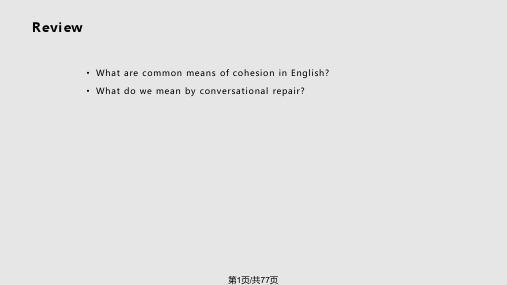
(1)What does ‘tall’ mean? (signify) (2)A nod means agreement. (indicate) (3)I know the place you mean. (refer to) (4)Your presence would mean a lot to me. (matter) (5)I am sorry. I didn’t mean to be late. (intend) (6)The boy wasn’t meant to be there. (supposed to)
Review
• What are common means of cohesion in English? • What do we mean by conversational repair?
第1页/共77页
Contents
7.1 The notion of semantics 7.2 Semantic properties 7.3 Semantic relations 7.4 Sense and reference
• The connotative meaning can be the same /different in different languages or cultures. e.g.: fox, machine BUT: dragon, dog, elephant (White Elephant)
detective
spy
decease
die
pegged out
slim
thin
skinny
strong-minded
firm
pig-headed
public servant government employee bureaucrat
语言学教程第一章ppt
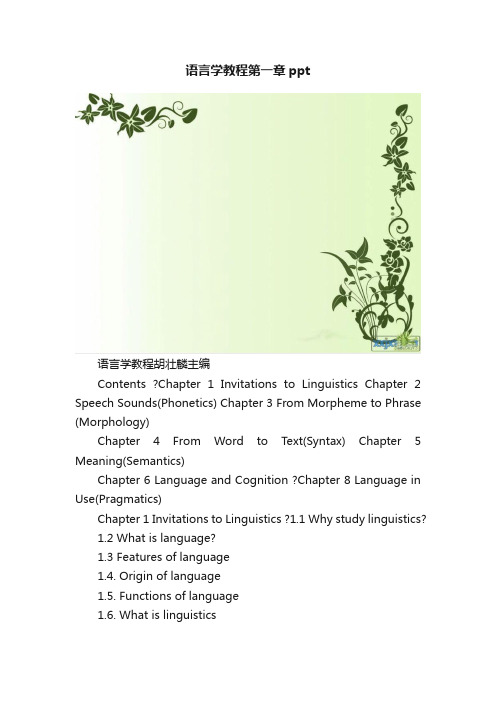
语言学教程第一章ppt语言学教程胡壮麟主编Contents ?Chapter 1 Invitations to Linguistics Chapter 2 Speech Sounds(Phonetics) Chapter 3 From Morpheme to Phrase (Morphology)Chapter 4 From Word to Text(Syntax) Chapter 5 Meaning(Semantics)Chapter 6 Language and Cognition ?Chapter 8 Language in Use(Pragmatics)Chapter 1 Invitations to Linguistics ?1.1 Why study linguistics?1.2 What is language?1.3 Features of language1.4. Origin of language1.5. Functions of language1.6. What is linguistics1.7 Main branches of linguistics1.8. Macrolinguistics1.9 Important distinctions in linguisticsLead-inQestion1: Other animals can beat us in many different ways, but what makes us superior to all of them?Qestion2: Why are children easy to undrstand their mother's tongue??Qestion3: Why do people in different social classes speak in different ways??Qestion4: Why is it "I love you" in English, but "私はあなたを愛して" in Japanese?1.2 What is language ?Language is a system of arbitrary vocal symbols used for human communication.__ by (英)沃德霍(Wardhaugh,R.)1.3 Design Features of languageArbitrarinessDualityCreativityDisplacement1.3.1 Arbitrariness ?Arbitrariness: the forms of linguistic signs bear no natural relationship to their meaning –Saussure.Eg: name,book,pen(1) Arbitrary relationship between the sound of a morpheme and its meaning.Eg: Hi, Aha,Hush, Hem, Hey.(2) Arbitrariness at the syntactic level: according to systemic-functionalists and American functionalists, language is not arbitrary at the syntactic level. In other words, syntax is less arbitrary than words.Eg: He came in and sat down.(3) Idiom is not arbitrary.Eg: apple-polisher, black sheep, a yellow dog.1.3.2 DualityDuality (double articulation)Lower level----sounds (meaningless Eg: Consonants and Vowels)Higher level----meaning (larger units of meaning Eg: word)A communication system with duality is considered more flexible than one without it, for a far greater number of messages can be sent.A small number of sounds can be grouped and regrouped into a large number of units of meaning (words), and the units of meaning can be arranged and rearranged into an infinite number of sentences. (we make dictionary of a1.3.3 CreativityPeculiar to human languages,users of language can understand and produce sentences they have never heard before, e.g. we can understand sentence like “A red-eyed elephant is dancing on the hotel bed”, though it does not describe a common happening in the world.Eg: 说曹操曹操到(not refer to Cao Cao himself)1.3.4 Displacement----Language can be used to refer to things, which are not present: real or imagined matters, in the past, present or future, or in far-away places.Eg: 911 events , New York1.4. Origin of language语言的起源是语言学的基本理论问题之一。
新编简明英语语言学教程 教案PPT 第一章上
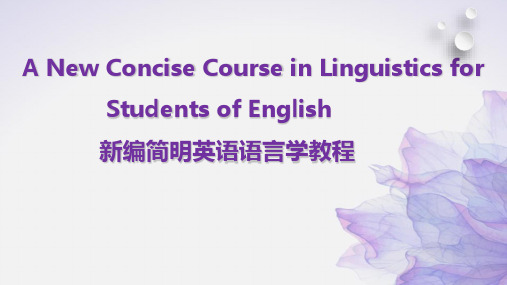
semantics(语义学)--the study of the meaning of language pragmatics(语用学)-- the study of meaning in the context of
language use.
The scopes of linguistics
sociolinguistics(社会语言学)-- how social factors affect language use psycholinguistics(心理语言学)-- linguistics behavior and
morphology(形态学)--the study of the way in which morphemes are arranged and combined to form words (the form of words)
syntax(句法学 )--the study of the rules that govern the combination of words to form grammatically permissible sentence
高职英语实用教程U1.1 听说课件
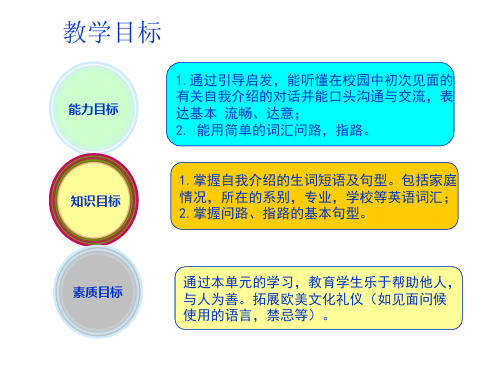
❖ 1. Sentence patterns on Introduction
❖ 2. Sentence patterns on asking and showing the ways.
Warming up
我们和他一起 感受一下大学 新生的校园生 活吧!
Michael is a freshman on the campus. From now on, he will lead a colorful college life.
library is?
miss it.
考核方式
dialogue
ROLE PLAY
Quality Education: be willing to help others, be kind, never give up, positive enterprising spirit.
情境1 情境2 情境3 情境4 情境5
New Words and Expressions
province ['prɒvɪns] n. 省 marketing ['mɑːkɪtɪŋ] n. 市场营销 major ['meɪdʒə] n. 专业 freshman ['freʃmən] n. 大一新生 department [dɪ'pɑːtm(ə)nt] n. 系 tour [tʊə] n. & v. 旅游,旅行 economic [,iːkə'nɒmɪk] adj. 经济的 campus ['kæmpəs] n. (大学)校园 management ['mænɪdʒm(ə)nt] n. 管理
情境1 情境2 情境3 情境4 情境5
LISTEN
情境1 情境2
英语语言学Linguistics 第一章Chapter1 导论Introduction
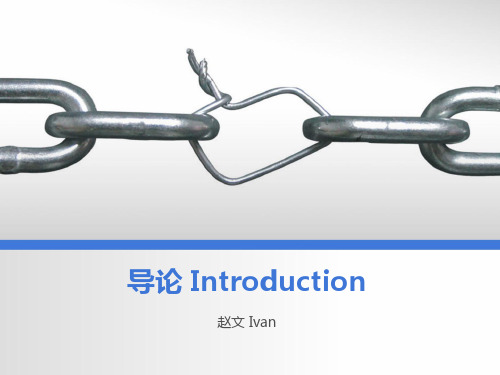
Displacement移位性/不受时空限制
Language can be used to refer to things, which are not present: real or imagined matters in the past, present or future, or in far-away places. Language can be used to refer to contexts removed from immedite situation. (P. 9) 用语言谈论超越说话人所处语境的任何人或物或事,语言 使用不受时空限制。
基础 认知 感觉器官↓ ↑认知水平提高 反映 脑神经↓ ↑ 心理现实 编码 离散化分类概括 ↓ ↑表达对象 指称 义(概念范畴) 语言符号 ↓(社会)约定 一般性 音(语音形式) ↑
{
客观现实
{
音响(物质材料 )特殊性
In the beginning was the word. —John 1:1
Any elements of language not arbitrary?
Arbitrariness任意性
Onomatopoeic words (which imitate natural sounds) are somewhat motivated理据 ( English: rumble, crackle, bang, …. Chinese: putong, shasha, dingdang… ) Some compound words are not entirely arbitrary, e.g. type-writer, shoe-maker, air-conditioner, photocopy…
语言学教程第一章总结
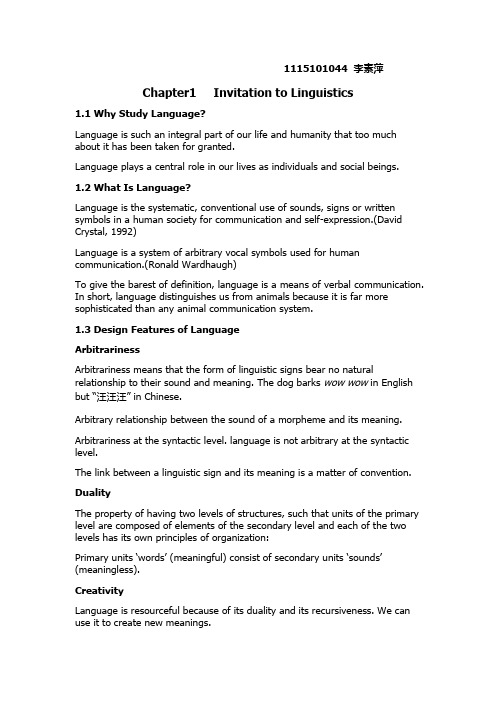
1115101044 李素萍Chapter1 Invitation to Linguistics1.1 Why Study Language?Language is such an integral part of our life and humanity that too much about it has been taken for granted.Language plays a central role in our lives as individuals and social beings.1.2 What Is Language?Language is the systematic, conventional use of sounds, signs or written symbols in a human society for communication and self-expression.(David Crystal, 1992)Language is a system of arbitrary vocal symbols used for human communication.(Ronald Wardhaugh)To give the barest of definition, language is a means of verbal communication. In short, language distinguishes us from animals because it is far more sophisticated than any animal communication system.1.3 Design Features of LanguageArbitrarinessArbitrariness means that the form of linguistic signs bear no natural relationship to their sound and meaning. The dog barks wow wow in English but “汪汪汪” in Chinese.Arbitrary relationship between the sound of a morpheme and its meaning. Arbitrariness at the syntactic level. language is not arbitrary at the syntactic level.The link between a linguistic sign and its meaning is a matter of convention. DualityThe property of having two levels of structures, such that units of the primary level are composed of elements of the secondary level and each of the two levels has its own principles of organization:Primary units ‘words’ (meaningful) consist of secondary units ‘sounds’ (meaningless).CreativityLanguage is resourceful because of its duality and its recursiveness. We can use it to create new meanings.Words can be used in new ways to mean new things, and can be instantly understood by people who have never come across that usage before. Information imparted by animals is severely limited and confined to a small set of messages, as birds, bees.Because of duality the human speaker is able to combine the basic linguistic units to form an infinite set of sentences, most of which are never before produced or heard.Language is creative in another sense,that is, its potential to create endless sentences.DisplacementHuman languages enable their users to symbolize objects, events and concepts which are not present (in time and space) at the moment of communication. Thus, we can refer to Confucius, or the North Pole.In a word, intellectual benefits of displacement to us is that it makes possible for us to talk and think in abstract terms.1.4 Origin of LanguageThe”bow-wow”, the” po oh-pooh” and the” yo-he-yo” theory1.5 Functions of LanguageLinguists talk about the functions of language in an abstract sense, that is, not in terms of using language to chat, to think, to buy and sell, to read and write, to greet, praise and condemn people, etc.For Jakobson, language is above all for communication.While for many people, the purpose of communication is referential, for him (and the Prague school structuralists), reference is not the only, not even the primary goal of communication.In conjunction with speaker, addressee, context, message, code, contact, Jakobson established a well-known framework of language functions based on the six key elements of communication, namely:referential (to convey message and information), poetic (to indulge in language for its own sake), emotive (to express attitudes, feelings and emotions), conative (to persuade and influence others through commands and requests), phatic (to establish communion with others),metalingual (to clear up intentions and meanings).Halliday proposes a theory of metafunctions of language, that is, language has ideational, interpersonal and textual functions.Informative function(ideational function)信息功能Language is the instrument of thought and people often feel need to speak their thoughts aloud.Language serves for the expression of content and give helps to determine our way of looking at things.Interpersonal Function人际功能By far the most important sociological use of language, and by which people establish and maintain their status in a society, e.g. Dear Sir, Dear Professor, Johnny, yours, your obedient servant.It is concerned with interaction between the addresser and addressee in the discourse situation.Performative Function施维功能Language canbe used to do things, to perform action.It is primarily to change the social status of persons and is usually quite formal and even ritualized. For example, in Chinese when someone breaks a bowl or a plate the host or the people present are likely to say sui sui ping an. Emotive Function感情功能It is one of the most powerful uses of language because it is crucial in changing the emotional status of an audience for or against someone or something.It is a means of getting rid of our nervous energy when we are under stress, e.g. God, My, Damn it, What a sight, Wow, Ugh, Oh.It is also discussed under the term expressive function. The expressive function can often be entirely personal and totally without any implication of communication to others.Phatic Communion寒暄功能It refers to the social interaction of language.We all use small, seemingly meaningless expressions to maintain a comfortable relationship between people without involving any factual content. Ritual exchanges about health or weather such as Good morning, God bless you, Nice day often state the obvious.Recreational Function娱乐功能The recreational function of a language is often overlooked because it seems so restrictive in purpose and supposedly so limited in usefulnessThe use of language for the sheer joy of using it, such as a baby's babbling or a chanter's chanting.Metalingual Function元语言功能Our language can be used to talk about itself, for example, I can use the word book to talk about a book, and I can also use the expression “the word book” to talk about the sign “book” itself.1.6 What Is Linguistics?Linguistics is usually defined as the scientific study of language or, alternatively, as the scientific study of language. Linguistics is a rich and exciting field.Linguistics has firmly established its place as a major branch of humanities and social sciences as well.1.7 Main Branches of LinguisticsPhonetics语音学Phonetics studies speech sounds, including the production of speech, that is how speech sounds are actually made, transmitted and received, the description and classification of speech sounds, words and connected speech, etc.Phonology音系学Phonology studies the rules governing the structure, distribution, and sequencing of speech sounds and the shape of syllables. It deals with the sound system of a language by treating phoneme as the point of departure.A phoneme is the smallest linguistic unit of sound that can signal a difference in meaning.Morphology形态学Morphology is concerned with the internal organization of words. It studies the minimal units of meaning — morphemes and word-formation processes. Syntax 句法学Syntax is about principles of forming and understanding correct sentences. Semantics语义学Semantics examines how meaning is encoded in a language.Pragmatics语用学Pragmatics is the study of meaning in particular context. In other words, pragmatics is concerned with the way language is used to communicate rather than with the way language is internally structured.1.8 MacrolinguisticsOther disciplines such as psychology, sociology, ethnography, the science of law and artificial intelligence etc. are also preoccupied with language.Psycholinguistics心理语言学Psycholinguistics investigates the interrelation of language and mind, for example, in processing and producing utterances and in language acquisition. Sociolinguistics社会语言学Sociolinguistics is the study of the characteristics of language varieties, the characteristics of their functions, and the characteristics of their speakers as these three constantly interact and change within a speech community. Anthropological Linguistics人类语言学Anthropological linguists are interested primarily in the history and structureof formerly unwritten languages.Computational Linguistics计算语言学Computational linguistics centers around the use of computers to process or produce human language(also known as “natural language”, to distinguish it from computer languages).To this field, linguistics contributes an understanding of the special properties of language data, and provides theories and descriptions of language structure and use.1.21.What are synchronic and diachronic studies?The description of a language at some point of time (as if it stopped developing)is a synchrony study (synchrony). The description of a language as it changes throughtime is a diachronic study (diachronic). An essay entitled “On the Use of THE”,for example, may be synchronic, if the author does not recall the past of THE, andit may also be diachronic if he claims to cover a large range or period of time whereinTHE has undergone tremendous alteration (see Hu Zhuanglin et al.,pp25-27).1.22.What is speech and what is writing?No one needs the repetition of the general principle of linguistic analysis, namely, the primacy of speech over writing. Speech is primary, because it existedlong long before writing systems came into being. Genetically children learn to speak before learning to write. Secondly, written forms just represent in this way or thatthe speech sounds : individual sounds, as in English and French as in Japanese.In contrast to speech, spoken form of language, writing as written codes, giveslanguage new scope and use that speech does not have. Firstly, messages can be carriedthrough space so that people can write to each other. Secondly, messages can be carriedthrough time thereby, so that people of our time can be carried through time thereby,so that people of our time can read Beowulf, Samuel Johnson, and Edgar A. Poe. Thirdly,oral messages are readily subject to distortion, either intentional or unintentional(causing misunderstanding or malentendu), while written messages allow and encouragerepeated unalterable reading. Most modern linguistic analysis is focused on speech,different from grammarians of the last century and theretofore.1.23.What are the differences between the descriptive and the prescriptive approaches?A linguistic study is “descriptive” if it only describes and analyses the facts of language, and “prescriptive” if it tries to lay down rules for??“correct” language behavior. Linguistic studies before this century were largely prescriptivebecause many early grammars were largely prescriptive because many early grammarswere based on “high” (literary or religious) written records. Modern linguistics is mostly descriptive, however. It (the latter) believes that whatever occurs in natural speech (hesitation, incomplete utterance, misunderstanding, etc.) should bedescribed in the analysis, and not be marked as incorrect, abnormal, corrupt, or lousy.These, with changes in vocabulary and structures, need to be explained also.1.24.What is the difference between langue and parole?F. de Saussure refers “langue”to the abstract linguistic system shared by all the members of a speech community and refers “parole” to the actual or actualizedlanguage, or the realization of langue. Langue is abstract, parole specific to thespeaking situation; langue not actually spoken by an individual, parole always anaturally occurring event; langue relatively stable and systematic, parole is a massof confused facts, thus not suitable for systematic investigation. What a linguistought to do, according to Saussure, is to abstract langue from instances of parole,i. e. to discover the regularities governing all instances of parole and make thanthe subject of linguistics. The langue-parole distinction is of great importance, which casts great influence on later linguists.1.25.What is the difference between competence and performance? According to N. Chomsky, “competence” is the ideal language user’s knowledgeof the rules of his language, and “performance” is the actual realization of thisknowledge in utterances. The former enables a speaker to produce and understand anindefinite number of sentences and to recognize grammatical mistakes and ambiguities.A speaker’s competence is stable while his performance is often influenced by psychological and social factor s. So a speaker’s performance does not always match or equal his supposed competence.Chomsky believes that linguists ought to study competence, rather than performance. In other words, they should discover what an ideal speaker knows of hisnative language.Chomsky’s competence-performance distinction is not exactly the same as , thoughsimilar to , F. de Saussure’s langue-parole distinction. Langue is a social product,and a set of conventions for a community, while competence is deemed as a propertyof the mind of each individual. Sussure looks at language more from a sociologicalor sociolinguistic point of view than N. Chomsky since the latter deals with his issuespsychologically or psycholinguistically.。
英语语言学实用教程答案UNIT1

Unit 1 Some Preliminaries about Language[Check your understanding]State whether each of the following statements is True or False.(1) There is universal agreement about the origin of language. F(2) Pet dogs can speak human languages. F(3) All human infants can speak some language. FNote: All normal human infants can learn to speak some language.(4) By creativity we mean the creative use of language as often practiced by poets. FNote: By creativity we mean that we can always create and understand new sentences never used before.(5) With different cultures there will be different languages. FNote: Some cultures can share the same language.(6) Not all uses of language are meant to convey new information. TNote: Example: language used for phatic communion is not meant to convey new information.■ In-Class Activities1. ASK:(1) What does “language” mean in each of the context s?a. a natural language; language in particular.b. a human-specific tool for communication; language in general.c. individual style of language use.d. a metaphorical way of referring to bees’ system of communication.(2) Is there any other context in which the use of the word means something else?Yes. Example: language for the computer like C+2. ASK:(1) What if there were no language?Omit.(2) What if there were only one language the world over?Omit.(3) What can we learn from this Bible story?Language is powerful as a tool of human communication.3. ASK:(1) Do you think the two statements are equally probable, and if not, why not?(a) is more likely than (b), because the word as the basic unit of meaning that can occur independently in language is finite in number, whereas the sentence as composed of words, though almost infinite in number, is made possible by our knowledge of vocabulary and grammar. We can always produce and understand sentences that we never come across before. In that sense, no sentence is really new.(2) In what context do we make the second statement?When we focus our attention on the meaning of a sentence or when we are concerned with theform of a sentence as found in a language class.4. ASK:(1) Are there onomatopoeic words in Chinese?Yes. e.g. “哗啦”、“扑通”、“喀嚓”.(2) Does the existence of onomatopoeic words overthrow the claim that language is arbitrary?No. Onomatopoeic words account for a very limited percentage in the vocabulary of a language.5. ASK:(1) Can one really invent a language of one’s own?No.(2) If not, why?A language comes into being and use by convention or agreement among its speakers.6. ASK:(1) Is there any basic flaw in this experiment?The process is not strictly controlled. There may have been some coincidence. The sample size is too small for the experiment to be valid.(2) Do you think we really can answer the question about the beginning of language?No, at least in the present condition where/when we cannot perform experiments on the human brain, the key organ of speech.7. ASK:(1) Can you identify the most likely order (from least to most advanced) of these samples?C→B→A(2) What features in each child’s utterances can you use as evidence to support your ordering?Child A: good syntax except for improper question form.Child B: visible development of syntax; overgeneralizationChild C: Not much syntax; two-word utterances; telegraphic sentences (sentences that contain only content words but lack function words)8. ASK:(1) It is often assumed that children imitate adults in the course of language acquisition. Canimitation account for the above production on the part of the child?Not wholly. There is counter evidence against the assumption, like the overgeneralization “go-ed” for “went”.(2) What distinguishes the child’s production from that of the adult?Overgeneralization of “-ed” for the past tense as shown by “holded”.9. ASK:(1) How do adults reinforce the process of children’s acquisition as exemplified here?They use explicit correction.(2) Do children know what they are doing wrongly?Not exactly.(3) Do the adults succeed in their reinforcement?Not always, at least.(4) How should we treat the “mistakes” that children make while acquiring their mother tongue?We may ignore them sometimes, although some amount of reinforcement may turn out to be helpful.10. ASK:(1) Do children learn through structured or simplified input, as suggested?Not always. There is evidence for both sides.(2) Can you offer some examples illustrating, representing the way adults talk to infants?Omit.Note: Motherese is characterized by shorter sentences, higher pitch, exaggerated intonation, higher proportion of content words to function words, simple syntax, more interrogatives and imperatives, more repetitions. Yet it is not syntactically simpler. Rather, it may include syntactically complex sentences such as questions: Do you want your juice now?Embedded sentences: Mommy thinks you should sleep now. Imperatives: Pat the dog gently! Negatives with tag questions: We don’t want to hurt him, do we?Indeed, it is fortunate that motherese is not syntactically restricted. If it were, children might not have sufficient information to extract the rules of their language.11. ASK(1) What measures do you suggest for protecting dialects as well as languages?Omit.(2) Do you think that someday people all over the world will speak only one language, or somedayno dialect will exist?Omit.12. ASK:Are there any universals that you think all languages share but are not mentioned here?E.g. All languages have internal structures.All languages have numericals.■ ExercisesTask 3: Study Questions1. What do you think is essential to the emergence of language?The existence of social activities; the need to express diverse ideas, emotions, etc.; the need to communicate ideas to distant places; etc.2. Can our pets learn human languages? Why or why not?No. They are genetically not endowed with the capacity.3. What role does body language play in language communication?Omit.4. N aturally occurring “experiments” with so-called “wolf-children”, “bear-children”,“Mowgli”or “monkey-children” and other such feral youngsters have been widely reported for hundreds of years. None of these children could speak or understand speech and, indeed, most efforts to teach them language ended in failure. How would you account for the failure?The language acquisition device has to be triggered before a certain age (that of puberty). Sufficient expose to a language environment at the right time is essential to language acquisition.5. The following are some instances of using English for communication. What specific functiondoes each use of English serve in the following pictures?Informative (in the form of commanding)Directive (Advertising in the form of requesting)Directive (Persuading in the form of threatening)Directive (Recruiting)6.Iconicity of language is an aspect of language where form echoes meaning. Onomatopoeia, also known as “sound symbolism”, is one type of iconicity. Some researchers have found other evidence of iconicity. For example, words beginning with the sound combination sl- in English often have an unpleasant sense, as in slithering, slimy, slugs. Here are some questions:a. Is the “unpleasant” sense actually true of all, or even most, words beginning with sl- in English? No. e.g. slight.b. Are there any other sounds or sound combinations that you associate with particular meanings? Gliding: slide, slip, slippery;Rolling: tumble, crumble, stumblec. How about the vowel sounds in words that identify near-to-speaker concepts (this, near, here) versus far-from-speaker concepts (that, far, there)? What is the difference? Is it a general pattern distinguishing terms for things that are near versus far in English? What about the case in Chinese?Front vowels for near-speaker concepts; central or back vowels for far-from-speaker concepts. There seems to be a similar kind of pattern in Chinese. C.f. 近jin /远yuan;这zhe /那na7. In many of the world’s languages there are so-called nursery names for parents. In English, for example, corresponding to the word mother is the nursery name mama, and for father one finds dada and papa. There is remarkable similarity across different languages in the form of these nursery names for parents. For example, in Chinese and Navajo ma corresponds to English mama. Why do you think that this is the case?Bilabials are learned and produced first because they are the easiest.8.a. What are some of the changes which appear to have taken place in the child’s ability to use English during that period?Like the basically proper use of interrogatives and the correct use of inflection.b. What do these changes suggest about the order of language acquisition?Complete sentences are acquired later than elliptical ones. Inflection is acquired at a late stage.。
英语语音教程Unit1

04
Example
Speak the sentence "I want to go to the park" at a modal speed, allowing listeners to understand each word clearly
• Accounting the correct syntax is essential for accurate enrollment It also helps listeners understand the intended meaning of the spoon word
Introduction and rhythm
Syllable and word stress
• A symmetrical is a unit of promotion that contains a vowel sound Villables are the building blocks of words
• Word stress refers to the emphasis or emphasis placed on different syntax within a word In English, most words have a primary stress on one sellable, and secondary stress on one or more other sellable The placement of stress can significantly affect the meaning or emphasis of a word
Practice
Practice saying each sound separately and then gradually combine them into words and sentences
简明英语语言学教程1-8章知识要点
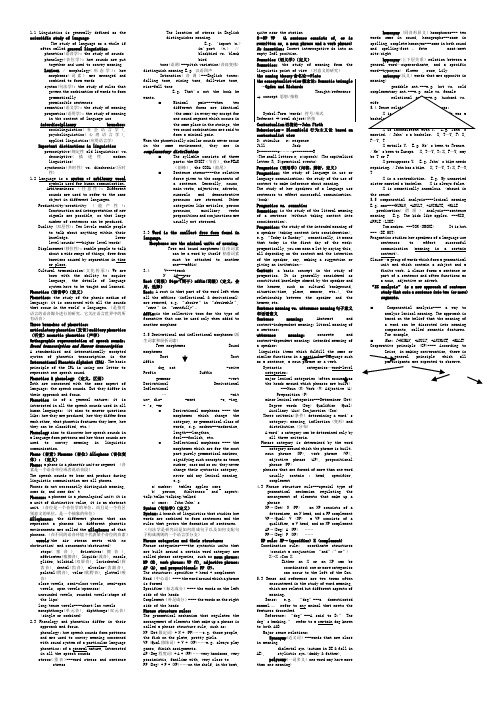
1.1 Linguistics is generally defined as the scientific study of language . The study of language as a whole if often called general linguistics . phonetics(语音学): the study of sounds phonology(音位学): how sounds are put together and used to convey meaning Lexicon / morphology(形态学): how morphemes(词素) are arranged and combined to form words syntax(句法学): the study of rules that govern the combination of words to form grammatically permissible sentences semantics(语义学): the study of meaning pragmatics(语用学): the study of meaning in the context of language use interdisciplinary branches: sociolinguistics(社会语言学), psycholinguistics(心理语言学), applied linguistics(应用语言学) Important distinctions in linguistics prescriptive(规定性 old linguistics) vs. descriptive(描述性 modern linguistics) synchronic(共时性) vs. diachronic(历时性) 1.2 Language is a system of arbitrary vocal symbols used for human communication. Arbitrariness (任意性): Different sounds are used to refer to the same object in different languages. Productivity/creativity (能产性): Construction and interpretation of new signals are possible, so that large number of sentences can be produced. Duality (双层性): Two levels enable people to talk about anything within their knowledge. lower level(sounds)---higher level(words) Displacement(移位性): enable people to talk about a wide range of things, free from barriers caused by separation in time or place. Cultural transmission(文化传承): We are born with the ability to acquire language, the details of language system have to be taught and learned. Phonetics (语音学)(定义) Phonetics: the study of the phonic medium of language: it is concerned with all the sounds that occur in the world’s languages.(是指对语言的语音媒介进行的研究,它关注语言世界中的所有语音) Three branches of phonetics: articulatory phonetics (发音)auditory phonetics (听觉)acoustic phonetics (声学) Orthographic representation of speech sounds :Broad transcription and Narrow transcription A standardized and internationally accepted system of phonetic transcription is the International Phonetic Alphabet (IPA). The basic principle of the IPA is using one letter to represent one speech sound. Phonetics & phonology :(定义,区别) Both are concerned with the same aspect of language: the speech sounds. But they differ in their approach and focus. Phonetics is of a general nature; it is interested in all the speech sounds used in all human languages; (it aims to answer questions like: how they are produced, how they differ from each other, what phonetic features they have, how they can be classified, etc.) Phonology aims to discover how speech sounds in a language form patterns and how these sounds are used to convey meaning in linguistic communication. Phone (音素)Phoneme (音位)Allophone (音位变体): (定义) Phone: a phone is a phonetic unit or segment (音素是一个语音单位或者说语音段) The speech sounds we hear and produce during linguistic communication are all phones. Phones do not necessarily distinguish meaning, some do, and some don’t Phoneme: a phoneme is a phonological unit ; it is a unit of distinctive value, it is an abstract unit.(音位是一个音位学的单位,而且是一个有区别意义的单位,是一个抽象的单位) Allophones: the different phones that can represent a phoneme in different phonetic environments are called the allophones of that phoneme.(在不同的语音环境下代表某个音位的音素) vowels (the air stream meets with no obstruction) and consonants(obstructed) stops(塞音), fricatives(擦音), affricates(塞擦音), liquids(流音), nasals, glides, bilabial(双唇音), laviodental(唇齿音), dental(齿音), alveolar(齿龈音), palatal(腭音), velar(软腭音), glottal(喉音) close vowels, semi-close vowels, semi-open vowels, open vowels(openness) unrounded vowels, rounded vowels(shape of the lips) long/tense vowels----short/lax vowels monophthongs(单元音), diphthongs(双元音) (single or combined)2.3 Phonology and phonetics differ in their approach and focus. phonology: how speech sounds form patterns and are used to convey meaning concerned with sound system of a particular language phonetics: of a general nature, interested in all the speech sounds stress(重音)---word stress and sentence stress The location of stress in English distinguishes meaning. E.g. ‘import (n.) im’port (v.) // blackbird vs. black bird tone(语调)---pitch variation(音高变体) distinguish meaning E.g. 汉语四声 Intonation(音调)---English tones: falling tone, rising tone, fall-rise tone, rise-fall tone E.g. That’s not the book he wants. ⏹ Minimal pair----when two different forms are identical (the same) in every way except for one sound segment which occurs in the same place in the strings, the two sound combinations are said to form a minimal pair. When the phonetically similar sounds never occur in the same environment, they are in complementary distribution . ⏹ The syllable consists of three parts: the ONSET (节首), the PEAK (韵峰), the CODA (韵尾) ⏹ Sentence stress----the relative force given to the components of a sentence. Generally, nouns, main verbs, adjectives, adverbs, numerals and demonstrative pronouns are stressed. Other categories like articles, person pronouns, auxiliary verbs prepositions and conjunctions are usually not stressed.3.3 Word is the smallest free form found in language. Morphemes are the minimal units of meaning. Free and bound morphemes(自由词素can be a word by itself 粘着词素must be attached to another one---affix) 3.4 V----teachN Af----er Root (词根)Stem (词干)affix(词缀)(定义,会用,选择)Root: A root is that part of the word left when all the affixes (inflectional & derivational) are removed, e.g. “desire” in “desirable”, “care” in “ca refully ”. Affix:is the collective term for the type of formative that can be used only when added to another morpheme 3.5 Derivational and inflectional morphemes(派生词素和屈折词素) Free morphemes Bound morphemes Root Root Affix dog, cat -ceive Prefix Suffix grammar -vert Derivational Derivational Inflectional … -mit un-, dis- -ment -s, -ing, -‘s, -er ● Derivational morphemes ---- the morphemes which change the category, or grammatical class of words, e.g. modern---modernize, length---lengthen, fool---foolish, etc. ● Inflectional morphemes ---- the morphemes which are for the most part purely grammatical markers, signifying such concepts as tense, number, case and so on; they never change their syntactic category, never add any lexical meaning, e.g. a) number: tables apples cars b) person, finiteness and aspect: talk/talks/talking/talked c) case: John/John’s Syntax (句法学)(定义) Syntax: A branch of linguistics that studies how words are combined to form sentences and the rules that govern the formation of sentences. (句法学是研究词是如何组成句子以及如何支配句子构成规则的一个语言学分支) Phrase categories and their structures Phrase categories----the syntactic units that are built around a certain word category are called phrase categories, such as noun phrase: NP (N), verb phrase: VP (V), adjective phrase: AP (A), and prepositional: PP (P). The structure: specifier + head + complement Head (中心语)---- the word around which a phrase is formed Specifier (标志成分)---- the words on the left side of the heads Complement (补足成分)---- the words on the right side of the heads Phrase structure rules: The grammatical mechanism that regulates the arrangement of elements that make up a phrase is called a phrase structure rule, such as: NP (Det 限定词) + N + (PP)……e.g. those people, the fish on the plate, pretty girls. VP (Qual 修饰词) + V + (NP)……e.g. always play games, finish assignments. AP (Deg 程度词) + A + (PP)……very handsome, very pessimistic, familiar with, very close to PP (Deg) + P + (NP)……on the shelf, in the boat, quite near the station S→NP VP (A sentence consists of, or is rewritten as, a noun phrase and a verb phrase)Do insertion: Insert interrogative do into an empty Infl position. Semantics (语义学)(定义)Semantics: the study of meaning from thelinguistic point of view (对意义的研究)Behaviorism→ Bloomfield 行为主义论 based on contextualist view S: stimulus r: responseJill Jack S---------r………s ---------R(The small letters r, sàspeech) (The capitalized letter R, Sàpractical events)Pragmatics (语用学)(问答,辨析,定义)Pragmatics: the study of language in use orlanguage communication; the study of the use ofcontext to make inference about meaning.The study of how speakers of a language usesentences to effect successful communication. (book)Pragmatics vs. semanticsSemantics: is the study of the literal meaning of a sentence (without taking context into consideration).Pragmatics: the study of the intended meaning ofa speaker (taking context into consideration), e.g. “Today is Sunday”, semantically, it means that today is the first day of the week;pragmatically, you can mean a lot by saying this,all depending on the context and the intention of the speaker, say, making a suggestion or giving an invitation…Context: a basic concept in the study ofpragmatics. It is generally considered as constituted knowledge shared by the speaker and the hearer, such as cultural background,situation(time, place, manner, etc.), the relationship between the speaker and the hearer,etc. Sentence meaning vs. utterance meaning 句子意义和话语意义 Sentence meaning: Abstract and context-independent meaning; literal meaning of a sentence; utterance meaning: concrete and context-dependent meaning; intended meaning of a speaker; linguistic items which fulfill the same or similar functions in a particular language such as a sentence, a noun phrase or a verb. Syntactic categories —word-level categories: major lexical categories (often assumed as the heads around which phrases are built) ---Noun (N) Verb (V) Adjective (A) Preposition (P) minor lexical categories---Determiner (Det) Degree words (Deg) Qualifier (Qual) Auxiliary (Aux) Conjunction (Con) Three criteria(条件) determining a word’s category: meaning, inflection (变形) and distribution (分布) A word’s category can be determined only by all three criteria. Phrase category is determined by the word category around which the phrase is built. noun phrase (NP), verb phrase (VP), adjective phrase (AP), prepositional phrase (PP) phrases that are formed of more than one word usually contain : head, specifier, complement 4.3 Phrase structure rule---special type of grammatical mechanism regulating the arrangement of elements that make up a phrase NP→(Det) N (PP) an NP consists of a determiner, an N head, and a PP complement VP→(Qual) V (NP) a VP consists of a qualifier, a V head, and an NP complement AP→(Deg) A (PP) …… PP→(Deg) P (NP) …… XP rule: XP→(specifier) X (complement) Coordination rule: coordinate structures (consist a conjunction “and”/”or”)X→X *Con X Either an X or an XP can be coordinated; one or more categories can occur to the left of the Con. 5.3 Sense and reference are two terms often encountered in the study of word meaning,which are related but different aspects of meaning.Sense: e.g. “dog”---a domesticated mammal... refer to any animal that meets the features describedReference: “dog”---A said to B:” The dog’s barking.” refer to a certain dog knownto both A&B Major sense relations:Synonymy (近义词)---words that are close in meaning dialectal syn.(autumn in BE & fall inAE), stylistic syn.(daddy & father), polysemy (一词多义)one word may have morethan one meaning)homonymy (同音形异义)homophones--- twowords same in sound, homographs---same in spelling, complete homonyms---same in both sound and spelling)feet 、fete meat/meet site/sighthyponymy (上下层关系)relation between a general word —superordinate, and a specific word--hyponyms) flower , rose, Lilyantonymy (反义)words that are opposite in meaning)gradable ant.---e.g. hot vs. cold complementary ant.---e.g. male vs. femalemarried. / John’s a bachelor. X, T—Y, F; X, F —Y, TX entails Y. E.g. He’s been to France. / He’s been to Europe. X, T—Y, T; X, F —Y, may be T or FX presupposes Y. E.g. John’s bike needs repairing. / John has a bike. X, T —Y, T; X, F —Y, TX is a contradiction. E.g. My unmarried sister married a bachelor. X is always false. X is semantically anomalous. (absurd in the sense)5.5 componential analysis----lexical meaning E.g. man---+HUMAN, +ADULT, +ANIMATE, +MALE predication(谓项) analysis---sentence meaning E.g. The kids like apples. ---KID, APPLE (LIKE) Tom smokes. ---TOM (SMOKE) It is hot. --- (BE HOT) Pragmatics studies how speakers of a language usesentences to effect successful communication (meaning in a certain context). Clause —a group of words which form a grammaticalunit and which contain a subject and a finite verb. A clause forms a sentence or part of a sentence and often functions as a noun, adjective or adverb.“IC analysis” is a new approach of sentencestudy that cuts a sentence into two (or more) segments. ⏹ Componential analysis---- a way toanalyze lexical meaning. The approach is based on the belief that the meaning of a word can be dissected into meaning components, called semantic features. For example,⏹ Man: [+HUMAN, +ADULT, +ANIMATE, +MALE] Cooperative principle (CP)---- According toGrice, in making conversation, there is a general principle which all participants are expected to observe.。
英语语言学教程(胡壮麟版)之欧阳家百创编
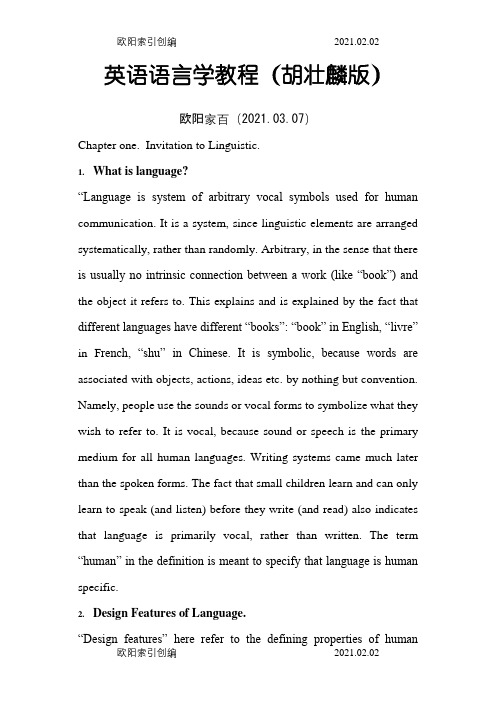
英语语言学教程(胡壮麟版)欧阳家百(2021.03.07)Chapter one. Invitation to Linguistic.1.What is language?“Language is system of arbitrary vocal symbols used for human communication. It is a system, since linguistic elements are arranged systematically, rather than randomly. Arbitrary, in the sense that there is usually no intrinsic connection between a work (like “book”) and the object it refers to. This explains and is explained by the fact that different languages have different “books”: “book” in English, “livre” in F rench, “shu” in Chinese. It is symbolic, because words are associated with objects, actions, ideas etc. by nothing but convention. Namely, people use the sounds or vocal forms to symbolize what they wish to refer to. It is vocal, because sound or speech is the primary medium for all human languages. Writing systems came much later than the spoken forms. The fact that small children learn and can only learn to speak (and listen) before they write (and read) also indicates that language is primarily vocal, rather than written. The term “human” in the definition is meant to specify that language is human specific.2.Design Features of Language.“Design features” here refer to the defining properties of humanlanguage that tell the difference between human language and any system of animal communication. They are arbitrariness, duality, productivity, displacement, cultural transmission and interchangeability(1)Arbitrariness: By “arbitrariness”, we mean there is no logicalconnection between meanings and sounds.(2)Duality: The property of having two levels of structures(phonological and grammatical), units of the primary level being composed of elements of the secondary level and each level having its own principles of organization.(3)Productivity: Productivity refers to the ability to the ability toconstruct and understand an indefinitely large number of sentences in one’s native language, including those that has never heard before, but that are appropriate to the speaking situation.The property that enables native speakers to construct and understand an indefinitely large number of utterances, including utterances that they have never previously encountered.(4)Displacement: “Displacement”, as one of the design features ofthe human language, refers to the fact that one can talk about things that are not present, as easily as he does things present.In other words, one can refer to real and unreal things, things of the past, of the present, of the future. Language itself can betalked about too.(5)Cultural transmission: This means that language is notbiologically transmitted from generation to generation, but that the details of the linguistic system must be learned anew by each speaker.(6)Interchangeability: Interchangeability means that any humanbeing can be both a producer and a receiver of messages.3.Functions of Language.Language has at least seven functions: phatic, directive, Informative, interrogative, expressive, evocative and performative.(1)Phatic function: The “phatic function” refers to languagebeing used for setting up a certain atmosphere or maintaining social contacts (rather than for exchanging information or ideas). Greetings, farewells, and comments on the weather in English and on clothing in Chinese all serve this function.(2)Directive function: The “directive function” means thatlanguage may be used to get the hearer to do something. Most imperative sentences perform this function, e. g., “Tell me the result when you finish.”(3)Informative function: Language serves an “informationalfunction” when used to tell something, characterized by the use of declarative sentences. Informative statements are often labeled as true (truth) or false (falsehood).(4)Interrogative function: When language is used to obtaininformation, it serves an “interrogative function”. This in cludes all questions that expect replies, statements, imperatives etc.(5)Expressive function: The “expressive function” is the use oflanguage to reveal something about the feelings or attitudes of the speaker.(6)Evocative function: The “evocative function” is the use oflanguage to create certain feelings in the hearer. Its aim is, for example, to amuse, startle, antagonize, soothe, worry or please.(7)Per formative function: This means people speak to “dothings” or perform actions.4. What is linguistic?“Linguistics” is the scientific study of language. It studies not just one language of any one society, but the language of all human beings.In short, linguistics studies the general principles whereupon all human languages are constructed and operate as systems of communication in their societies or communities.5. Main branches of linguistics.The study of language as a whole is often called general linguistics. But a linguist sometimes is able to deal with only one aspect of language at a time, thus the arise of various branches: phonetics, phonology, morphology, syntax, semantics, pragmatics, sociolinguistics, applied linguistics, psycholinguistics etc.6. Important distinctions in linguistic.(1) synchronic studyvs. diachronic studyThe description of a language at some point of time (as if it stopped developing) is a synchrony study (synchrony). The description of a language as it changes through time is a diachronic study (diachronic).(2) Speechvs. writingSpeech is primary, because it existed long before writing systems came into being. Genetically children learn to speak before learning to write. Secondly, written forms just represent in this way or that the speech sounds: individual sounds, as in English and French as in Japanese. In contrast to speech, spoken form of language, writing as written codes, gives language new scope and use that speech does not have. Most modern linguistic analysis is focused on speech, different from grammarians of the last century and theretofore.(3) Descriptivevs. prescriptiveA linguistic study is “descriptive” if it only describes and analyses the facts of language, and “prescriptive” if it tries to lay down rules for “correct” language behavior. Linguistic studies before this century were largely prescriptive because many early grammars were largely prescriptive because many early grammars were based on “high” (literary or religious) written records. Modern linguistics is mostly descriptive.(4). langue vs. paroleF. de Saussure refers “langue” to the abstract linguistic system shared by all the members of a speech community and refers “parole” to the actual or actualized language, or the realization of langue. Langue is abstract, parole specific to the speaking situation; langue not actually spoken by an individual, parole always a naturally occurring event; langue relatively stable and systematic, parole is a mass of confused facts, thus not suitable for systematic investigation. What a linguist ought to do, according to Saussure, is to abstract langue from instances of parole, i.e. to discover the regularities governing all instances of parole and make than the subject of linguistics. The langue-parole distinction is of great importance, which casts great influence on later linguists.(5). competence vs. performanceAccor ding to N. Chomsky, “competence” is the ideal language user’s knowledge of the rules of his language, and “performance” is the actual realization of this knowledge in utterances. The former enables a speaker to produce and understand an indefinite number of sentences and to recognize grammatical mistakes and ambiguities. A speaker’s competence is stable while his performance is often influenced by psychological and social factors. So a speaker’s performance does not always match or equal his supposed competence. Chomsky believes that linguists ought to study competence, rather than performance.(6). linguistic potential vs. linguistic behaviorThese two terms, or the potential-behavior distinction, were made by M. A. K. Halliday in the 1960s, from a functional point of view. There is a wide range of things a speaker can do in his culture, and similarly there are many things he can say, for example, to many people, on many topics. What he actually says (i.e. his “actual linguistic behavior”) on a certain occas ion to a certain person is what he has chosen from many possible injustice items, each of which he could have said (linguistic potential).Chapter 2 Phonetics1.What is phonetics?“Phonetics” is the science which studies the characteristics of human sound-making, especially those sounds used in speech, and provides methods for their description, classification and transcription, speech sounds may be studied in different ways, thus by three different branches of phonetics.(1) Articulatory phonetics; the branch of phonetics that examines the way in which a speech sound is produced to discover which vocal organs are involved and how they coordinate in the process.(2) Auditory phonetics, the branch of phonetic research from the hearer’s point of view, looking into the impression which a speech sound makes on the hearer as mediated by the ear, the auditory nerve and the brain.(3) Acoustic phonetics: the study of the physical properties of speech sounds, as transmitted between mouth and ear. Most phoneticians, however, are interested in articulatory phonetics.2. The IPAThe IPA, abbreviation of “International Phonetic Alphabet”, is a compromise system making use of symbols of all sources, including diacritics indicating length, stress and intonation, indicating phonetic variation. Ever since it was developed in 1888, IPA has undergone a number of revisions.3. Place of articulationIt refers to the place in the mouth where, for example, the obstruction occurs, resulting in the utterance of a consonant.4. Manner of articulationThe “manner of articulation” literally means the way a sound is articulated.5. Phonology“Phonology” is the study of sound systems- the invention of distinctive speech sounds that occur in a language and the patterns wherein they fall. Minimal pair, phonemes, allophones, free variation, complementary distribution, etc., are all to be investigated by a phonologist.6. Narrow transcription and broad transcription.The former was meant to symbolize all the possible speech sounds,including even the most minute shades of pronunciation while Broad transcription was intended to indicate only those sounds capable of distinguishing one word from another in a given language.7. Phone Phoneme AllophoneA “phone” is a phonetic unit or segment. The speech sounds we hear and produce during linguistic communication are all phones. When we hear the following words pronounced: [pit], [tip], [spit], etc., the similar phones we have heard are [p] for one thing, and three different [p]s, readily making possible the “narrow transcription or diacritics”. Phones may and may not distinguish meaning.A “phoneme” is a phonological unit; it is a unit that is of distinctive value. As an abstract unit, a phoneme is not any particular sound, but rather it is represented or realized by a certain phone in a certain phonetic context. For example, the phoneme[p] is represented differently in [pit], [tip] and [spit].The phones representing a phoneme are called its “allophones”, i.e., the different (i.e., phones) but do not make one word so phonetically different as to create a new word or a new meaning thereof. So the different [p] s in the above words is the allophones of the same phoneme [p]. How a phoneme is represented by a phone, or which allophone is to be used, is determined by the phonetic context in which it occurs. But the choice of an allophone is not random. In most cases it is rule-governed; these rules are to be found out by aphonologist.8.Minimal pairs?When two different phonetic forms are identical in every way except for one sound segment which occurs in the same place in the string, the two forms (i. e., word) are supposed to form a “minimal pair”, e.g., “pill” and “bill”, “pill” and “till”, “till” and “dill”, “till” and “kill”, etc. All these words together constitute a minimal set. They are identical in form except for the initial consonants. There are many minimal pairs in English, which makes it relatively easy to know what English phonemes are. It is of great importance to find the minimal pairs when a phonologist is dealing with the sound system of an unknown language.9. Free variation If two sounds occurring in the same environment do not contrast; namely, if the substitution of one for the other does not generate a new word form but merely a different pronunciation of the same word, the two sounds then are said to be in “free variation”.plementary distributionWhen two sounds never occur in the same environment, they are in “complementary distribution”. For example, the aspirated English plosives never occur after [s], and the unsaturated ones never occur initially. Sounds in complementary distribution may be assigned to the same phoneme.11. Assimilation rule.The “assimilation rule” assimilates one segment to another by “copying” a featu re of a sequential phoneme, thus making the two phones more similar.12. Deletion ruleThe “deletion rule” tell us when a sound is to be deleted although is orthographically represented.13. Suprasegmental phonology and suprasegmental features “Suprasegmental phonology” refers to the study of phonological properties of linguistic units larger than the segment called phoneme, such as syllable, length and pitch, stress, intonation.Chapter 3. Morphology1.Morpheme and MorphologyThe “morpheme” is the smallest unit in terms of relationship between expression and content, a unit which cannot be divided without destroying or drastically altering the meaning, whether it is lexical or grammatical.“Morphology” is the branch of grammar that studies the internal structure of words, and the rules by which words are formed. It is generally divided into two fields: inflectional morphology and lexical/derivational morphology.2.Types of Morphemes.(1)free morpheme and bound morphemeA “free morpheme” is a morpheme that constitu tes a word by itself, such as ‘bed”, “tree”, etc. A “bound morpheme” is one that appears with at least another morpheme, such as “-s” in “beds”, “-al” in “national” and so on.All monomorphemic words are free morphemes. Those polymorphemic words are either compounds (combination of two or more free morphemes) or derivatives (word derived from free morphemes).(2). root; affix; stemA “root” is the base form of a word that cannot be further analyzed without total loss of identity.It is the part of the word that is left when all the affixes are removed.“Affixes” is a collective term for the type of morpheme that can be used only when added to another morpheme (the root or stem), so affix is naturally bound. (prefix, suffix, infix)A “stem” is any morpheme or combination of morphemes to which an affix can be added.(3). Inflectional affix and derivational affix.Inflectional affixes: do not change the word class, but only added a minute or delicate grammatical meaning to the stem.Derivational affixes: often change the lexical meaning and word class. Inflectional affixes are mostly suffixes, and derivational affixes can be prefixes (sub-, de-) or suffixes (-er, -able).3. Inflection“Inflection” is the manifestation of grammatical relationships through the addition of inflectional affixes, such as number, person, finiteness, aspect, and case, which does not change the grammatical class of the items to which they are attached.4. Word formationIn its restricted sense, refers to the process of word variations signaling lexical relationships. It can be futuresub classified into the compositional type (compound) and the derivational type.5. Lexical change(1) lexical change proper(特有词汇变化)A. InventionB. Blending: blending is relative complex from of compounding, in which two words are blended by joining the initial part of the first word and the final part of the second word, or by joining the initial parts of the two words.C. Abbreviation: a new word is created by cutting the final part, the initial part, or both the initial and final parts accordingly.D. Acronym: acronym is made up from the first letters of the name of an organization, which have a heavily modified headword.E. Back-formation: it refers to an abnormal type of word-formation where a shorter word is derived by deleting an imagined affix from a longer form already in the language.F. Analogical creation: it can account for the co-existence of theforms, regular and irregular, in the conjugation of some English verbs.G. Borrowing:a. loanwords: the borrowing of loanwords is a process in which both form and meaning are borrowed with only a slight adaptation, in some causes, to the phonological system of the new language that they enter.b. loanblend: it is a process in which part of the form is native and the rest has been borrowed, but the meaning is fully borrowed.c. loanshift: it is a process in which the meaning is borrowed, and the form is native.d. loan translation: a special type of borrowing, in which each morpheme or word is translated in the equivalent morpheme or word in another language.(2). Morpho-syntactical change (形态句法变化)A. morphological change: the words have changed their formsB. syntactical change(3). Semantic change (语义变化)A. broading: a process to extend or elevate the meaning from its originally specific sense to a relative general one.B. narrowing: it refers to a process in which the original meaning of a word can be narrowed or restricted to a specific sense.C. meaning shift: the change of meaning has nothing to do with generalization or restriction.D. fork etymology: it refers to a change in form of a word or phrase, resulting from an incorrect popular notion of the origin or meaning of the term on from the influence of more familiar terms mistakenly taken to be analogous.(4). Phological change (音位变化)Refers to changes in sound leading to change in form.a. loss(语音的脱落)b. addition (语音的增加)c. metathesis (换位)d. assimilation (同化)(5). Orthographic change (书写法变化)Chapter Four. Syntax1. Syntax.“Syntax” is the study of the rules governing the ways in which words, word groups and phrases are combined to form sentences in a language, or the study of the interrelationships between sentential elements.2. Sentence.L. Bloomfield defines “sentence” as an independent ling uistic form not included by some grammatical marks in any other linguistic from, i. e., it is not subordinated to a larger linguistic form, and it is a structurally independent linguistic form. It is also called a maximum free form.3. Syntactic relations.“Syntactic relations” refer to the ways in which words, word groups or phrases form sentences; hence three kinds of syntactic relations: positional relations, relations of substitutability and relations of co-occurrence.a.“Positional relation”, or “word order”, refers to the sequentialarrangement to words in a language. It is a manifestation of a certain aspect of what F. de Saussure called “syntagmatic relations”, or of what other linguists call “horizontal relations”or “chain relations”.b.“Relations of substitutability” refer to classes or sets of wordssubstitutable for each other grammatically in same sentence structures. Saussure called them “associative relations”. Other people call them “paradigmatic/vertical/choice relations”.c.“Relations of co-occur rence”, one means that words of differentsets of clauses may permit or require the occurrence of a word of another set or class to form a sentence or a particular part ofa sentence. Thus relations of co-occurrence partly belong tosyntagmatic relations and partly to paradigmatic relations.3.Grammatical constructionGrammatical construction: it can be used to mean any syntactic construct which is assigned one or more conventional function in a language, together with whatever is linguistically conventionalized about its contribution to the meaning or use the construct contains.4.IC analysis and immediate constituents.“IC analysis” is a new approach of sentence study that cuts a sentence into two (or more) segments. This kind of pure segmentation is simply dividing a sentence into its constituent elements without even knowing what they really are. What remain of the first cut is called “immediate constituents”, and what are left at the final cut is called “ultimate constituents”.5.Endocentric and exocentric constructions“Endocentric construction” is one whose distribution is functionally equivalent to that of one or more of its constituents, i.e., a word or a group of words, which serves as a definable “centre” or “head”. Usually noun phrases, verb phrases and adjective phrases belong to endocentric types because the constituent items are subordinate to the head.“Exocentric construction”, opposite of endocentric construction, refers to a group of syntactically related words where none of the words is functionally equivalent to the group as whole; that is to say, there is no definable centre or head inside the group. Exocentric construction usually includes basic sentence, prepositional phrase, predicate (verb + object) construction, and connective (be + complement) construction.6.Coordination and subordination.They are two main types of endocentric construction.Coordination is a common syntactic pattern in English and other languages formed by grouping together two of more categories of the same type with the help of a conjunction such as “and”,“but”and “or”.Subordination refers to the process or result of linking linguistic units so that they have different syntactic status, one being dependent upon the other, and usually a constituent of the other. (three basic types of subordination clause: complement clause, adjunct clause, relation clause.)7. Syntactic function(1) Subject: “subject” refers to one of the nouns in the nominative case. In English, the subject of a sentence is often said to be the doer of the action, while the object is the person or thing acted upon by the doer.a. Grammatical subject: it refers to a noun which can establish correspondence with the verb and which can be checked by a tag-question test, e.g., “He is a good cook, (isn’t he?).”b. Logical subject: the original object noun phrase occupies the grammatical space before a verb, the space that a subject normally occupies, the core subject, now the object of a preposition, is called the logical subject.(2). Predicate: A “predicate” re fers to a major constituent of sentence structure in a binary analysis in which all obligatory constituentsother than the subject are considered together. e.g., in the sentence “The monkey is jumping”, “is jumping” is the predicate.(3) Object: “object” r efers to the receiver or goal of an action and it is further classified into two kinds: direct object and indirect object. In some inflecting languages, an object is marked by case labels: the “accusative case” for direct object, and the “dative case” for direct object, and the “dative case” for indirect to word order (after the verb and preposition) and by inflections (of pronouns). e.g., in the sentence “John kissed me”, “me” is the object. Modern linguists suggest that an object refers to such an item that it can become a subject in passive transformation.8. CategoryThe term “category” in some approaches refers to classes and functions in its narrow sense, e.g., noun, verb, subject, predicate, noun phrase, verb phrase, etc. More specifically it refers to the defining properties of these general units: the categories of the noun, for example, include number, gender, case and countability; and of the verb, for example, tense, aspect, voice, etc.(1)Number: “Number” is a grammatical category used for theanalysis of word classes displaying such contrasts as singular, dual, plural, etc. In English, number is mainly observed in nouns, and there are only two forms: singular and plural. Number is also reflected in the inflections of pronouns and verbs.(2)Gender: “Gender” displays such contrasts as “masculine”,“feminine”, “neuter”, or “animate” and “inanimate”, etc., for the analysis of word classes. When word items refer to the sex of the real-world entities, we natural gender (the opposite is grammatical gender).(3)Case: “Case” identifies the syntactic relationship between wordsin a sentence. In Latin grammar, cases are based on variations in the morphological forms of the word, and are given the terms “accusative”, “nominative”, “dative”, etc. In English, the case category is realized in three ways: by following a preposition and by word order.(4)Agreement (or Concord): “Concord” may be defined asrequirement that the forms of two or more words of specific word classes that stand in specific syntactic relationship with one another shall be characterized by the same paradigmatically marked category or categories, e.g., “man runs”, “men run”.9. Syntagmatic relation and paradigmatic relationSyntagmatic relation: it is a relation between one item and other in a sequence, or between elements which are all present, such as the relation between “weather” and the others in the following sentence “If the weather is nice, we’ll go out.”Paradigmatic relation:it is also called Associative, a relation between elements replaceable with each other at a particular place ina structure, or between one element present and the others absent. It is also known as the vertical relation or choice relation.10. Phrase; clause and sentence.A “phrase” is a single element of structure containi ng more than one word, and lacking the subject-predicate structure typical of “clauses”. Traditionally, it is seen as part of a structural hierarchy, falling between a clause and word, e.g., “the three tallest girls” (nominal phrase). There is now a tendency to make a distinction between word groups and phrases. A “word group” is an extension of a word of a particular class by way of modification with its main features of the class unchanged. Thus we have nominal group, verbal group, adverbial group, conjunction group and preposition group.A “clause” is group of words with its own subject and predicate included in a larger subject-verb construction, namely, in a sentence. Clauses can also be classified into two kinds: finite and non-finite clauses, the latter referring to what are traditionally called infinitive phrase, participle phrase and gerundial phrase.Sentence is the minimum part of language that expresses a complete thought. Bloomfield (1935) defined the sentence as “one not included by virtue of any grammatical construction in any larger linguistic form.”11. RecursivenessIt mainly means that a phrasal constituent can be embedded withinanother constituent having the same category. By “recursiveness” we mean that there is theoretically no limit to the number of the embedded clauses in a complex sentence. This is true also with nominal and adverbial clauses, e.g., “I saw the man who killed a cat who…a rat which…that…”(1)Conjoining: “Conjoining” refers to a construction where oneclause is co-ordinate d or conjoined with another, e. g., “John bought a cat and his wife killed her.”(2)Embedding:“Embedding” refers to the process of constructionwhere one clause is included in the sentence (or main clause) in syntactic subordination, e.g., “I saw the man who had killed a chimpanzee.”12. Beyond the sentence(1) Sentential connection: the notion of hypotactic and paratactic relations can also be applied to the study of syntactic relations between sentences.a. “Hypotactic relation” refers to a construction whe re constituents are linked by means of conjunction, e.g. “He bought eggs and milk.”b. “Paratactic relation” refers to constructions which are connected by juxtaposition, punctuation or intonation, e. g., “He bought tea, coffee, eggs and milk” (pay attenti on to the first three nouns connected without “and”).(2). Cohesion:。
- 1、下载文档前请自行甄别文档内容的完整性,平台不提供额外的编辑、内容补充、找答案等附加服务。
- 2、"仅部分预览"的文档,不可在线预览部分如存在完整性等问题,可反馈申请退款(可完整预览的文档不适用该条件!)。
- 3、如文档侵犯您的权益,请联系客服反馈,我们会尽快为您处理(人工客服工作时间:9:00-18:30)。
《英语语言学实用教程》
教学提示
Unit 1 Some Preliminaries about Language
[Check your understanding]
State whether each of the following statements is True or False.
(1) There is universal agreement about the origin of language. F
(2) Pet dogs can speak human languages. F
(3) All human infants can speak some language. F
Note: All normal human infants can learn to speak some language. (4) By creativity we mean the creative use of language as often practiced by poets. F
Note: By creativity we mean that we can always create and understand new sentences never used before.
(5) With different cultures there will be different languages. F
Note: Some cultures can share the same language.
(6) Not all uses of language are meant to convey new information. T Note: Example: language used for phatic communion is not meant to convey new information.
■ In-Class Activities
1. ASK:
(1) What does “language” mean in each of the context s?
a. a natural language; language in particular.
b. a human-specific tool for communication; language in general.
c. individual style of language use.
d. a metaphorical way of referring to bees’ system of communication.
(2) Is there any other context in which the use of the word means something else?
Yes. Example: language for the computer like C+
2. ASK:
(1) What if there were no language?
Omit.
(2) What if there were only one language the world over?
Omit.
(3) What can we learn from this Bible story?
Language is powerful as a tool of human communication.
3. ASK:
(1) Do you think the two statements are equally probable, and if not, why not?
(a) is more likely than (b), because the word as the basic unit of meaning that can occur independently in language is finite in number,
whereas the sentence as composed of words, though almost infinite in number, is made possible by our knowledge of vocabulary and grammar. We can always produce and understand sentences that we never come across before. In that sense, no sentence is really new.
(2) In what context do we make the second statement?
When we focus our attention on the meaning of a sentence or when we are concerned with the form of a sentence as found in a language class.。
